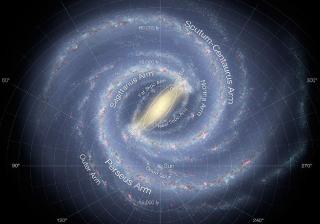Bibcode
Güver, Tolga; Özel, Feryal; Cabrera-Lavers, A.; Wroblewski, Patricia
Bibliographical reference
The Astrophysical Journal, Volume 712, Issue 2, pp. 964-973 (2010).
Advertised on:
4
2010
Journal
Citations
259
Refereed citations
237
Description
Low-mass X-ray binaries (LMXBs) that show thermonuclear bursts are ideal
sources for constraining the equation of state of neutron star matter.
The lack of independent distance measurements for most of these sources,
however, prevent a systematic exploration of the masses and radii of the
neutron stars, hence limiting the equation-of-state studies. We present
here a measurement of the distance to the LMXB 4U 1608-52 that is based
on the study of the interstellar extinction toward the source. We first
model the individual absorption edges of the elements Ne and Mg in the
high-resolution X-ray spectrum obtained with XMM-Newton. We then combine
this information with a measurement of the run of reddening with
distance using red clump stars and determine a minimum distance to the
source of 3.9 kpc, with a most probable value of 5.8 kpc. Finally, we
analyze time-resolved X-ray spectra of Type I X-ray bursts observed from
this source to measure the mass and the radius of the neutron star. We
find a mass of M = 1.74 ± 0.14 M sun and a radius of R
= 9.3 ± 1.0 km, respectively. This mass and radius can be
achieved by several multi-nucleon equations of state.
Related projects

Morphology and dynamics of the Milky Way
This project consists of two parts, each differentiated but both complementary: morphology and dynamics. Detailed study of the morphology of the Milky Way pretends to provide a data base for the stellar distribution in the most remote and heavily obscured regions of our Galaxy, through the development of semiempirical models based on the
Martín
López Corredoira